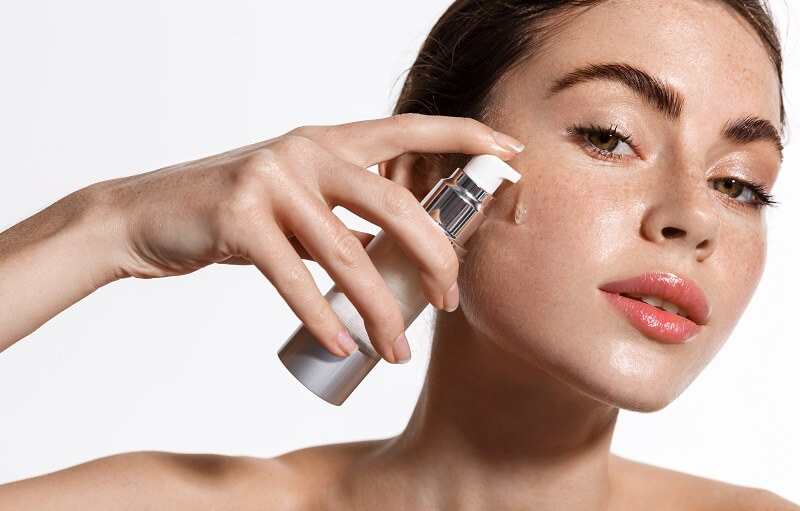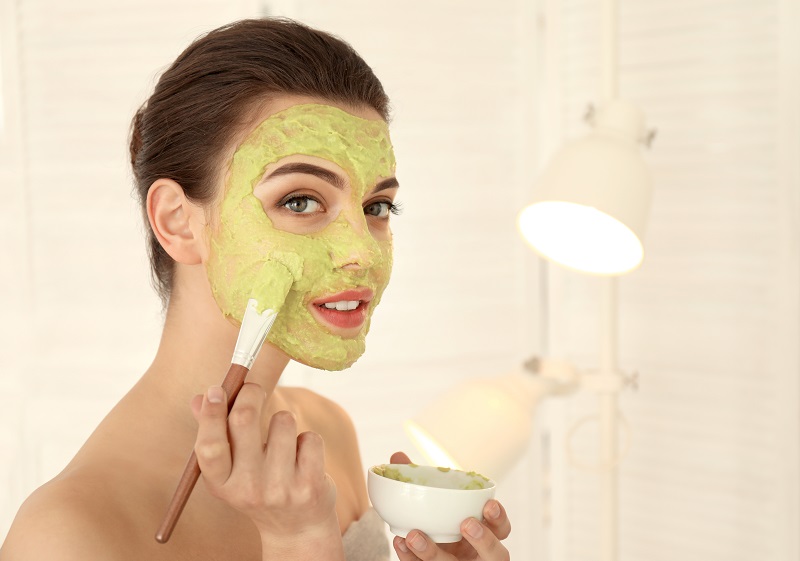Avocado is known for its amazing nutritional value that helps lower the risk of cardiovascular diseases. There is promising evidence suggesting it may also promote skin health. Cosmetic professionals have recognized its potential and use avocado oil in facial masks, creams, and serums to improve various skin conditions.
This article lists the benefits of avocado oil for the skin and explains how best to use it.

10 Benefits of Avocado Oil for the Skin
Avocado oil is derived from the pulp of the avocado fruit. Even though the oil’s nutritional profile is slightly different than the fruit’s, it still contains many beneficial ingredients that promote skin health. Skin experts hold it in high regard because of its lipid and antioxidant content.
Note: Learn about the benefits of using antioxidant skin care products.
Clinical studies and user experience show the following benefits of using avocado oil.
1. Avocado Oil for Inflammation
Several nutrients in avocado oil have anti-inflammatory properties, helping to soothe red, irritated, and problematic skin. They include:
- Linoleic acid (omega-6 fatty acid)
- Oleic acid (omega-9 fatty acid)
- Lutein and zeaxanthin (carotenoids)
- Vitamin E and C (vitamins with potent antioxidant properties)
- Tyrosol and hydroxytyrosol (polyphenols with potent antioxidant properties)
2. Avocado Oil for Skin Tightening
Fatty acids and carotenoids in avocado oil may inhibit collagen breakdown, while antioxidants protect the skin from environmental factors. These ingredients work together to help maintain firmer, tighter skin.
Note: Learn more about the numerous benefits of collagen for the skin and all non-invasive ways to boost collagen production.
3. Avocado Oil for Dry, Irritated Skin

Avocado oil is an emollient – it increases moisture levels in the skin, making it softer and smoother. The ingredients in avocado oil that improve hydration include:
- Vitamin E
- Vitamin A
- Fatty acids
- Potassium
- Lecithin
Note: Learn how to establish the best skin care routine for dry skin.
4. Avocado Oil for UV Damage
Avocado oil contains several nutrients that may help reduce the harmful effects of UV radiation on the skin. It has a high concentration of lutein and zeaxanthin, carotenoids that are able to absorb and scatter UV radiation. Additionally, its high antioxidant content helps to reduce UV damage to skin cells.
Avocado oil also has emollient properties, and properly hydrated skin may be more resilient to harmful environmental factors.
Note: Avocado oil may contribute to reducing UV damage, but it can’t be used as a substitute for sunscreen. Choose among these best sunscreen products for maximum protection.
5. Avocado Oil for Dark Spots
Avocado oil contains vitamins E and C, which help fight free radicals and UV damage, thus preventing signs of premature aging skin, like dark spots. In addition, fatty acids (such as oleic and linoleic acid) help moisturize the skin, potentially reducing the appearance of dark spots with regular use.
6. Avocado Oil for Acne

Linoleic acid is associated with antimicrobial activity, inhibiting acne-inducing bacteria. Other anti-inflammatory ingredients in avocado oil also reduce inflammation that causes acne breakouts. Avocado oil doesn’t leave a greasy residue, so it can help acne patients with both oily and dry skin.
7. Avocado Oil for Psoriasis and Eczema
The hydrating and anti-inflammatory properties of avocado oil help relieve dry, flaky, and irritated skin. Studies suggest it can be used as a long-term treatment for psoriasis, and many skin experts recommend it for eczema, seborrheic dermatitis, and other dry skin issues.
Note: If you or a loved one are struggling with eczema, learn more about the best holistic eczema treatments.
8. Avocado Oil for Wrinkles
Studies suggest the fatty acids and beta-carotene in avocado oil may improve collagen synthesis, while antioxidants help neutralize free radicals that cause premature skin aging. These processes help smooth the skin and reduce the appearance of fine lines, wrinkles, and other aging signs.
9. Avocado Oil for Skin Wounds
According to research, fatty acids, beta-carotene, lecithin, and vitamins A, C, D, and E in avocado oil encourage the proliferative phase of wound healing. This means avocado oil has a potential to support the growth of cells and the rebuilding of connective tissue after injury, helping wounds heal faster.
10. Avocado Oil for Increased Hydration

All skin types can suffer from dehydration, causing various symptoms, from dull and tight skin to fine lines and wrinkles. It is necessary to hydrate the skin from both inside and out by applying adequate moisturizers and drinking enough water.
Skin experts recommend daily use of facial oils and moisturizers with avocado oil to increase hydration. Vibrant Skin Bar’s team recommends Osmosis MD Nourish - Avocado Facial Oil for its medical-grade, organic formulation, which protects the skin from moisture loss and environmental factors and increases its luminosity.
How to Use Avocado Oil for the Skin?
Avocado oil for the skin is best used topically to ensure quick absorption into the dermis. It can be used alone or as an ingredient in facial masks, creams, and shower gels.
Always use unrefined, cold-pressed avocado oil to ensure it contains beneficial vitamins and minerals, not only fatty acids.
Face Mask

Recipes for avocado oil facial masks involve mixing the oil with honey, yogurt, mashed avocado, egg whites, banana, turmeric, or other natural ingredients, depending on your skin type and needs.
This avocado face mask will leave your skin feeling deeply hydrated:
Mix 1 tablespoon of avocado oil, 1 tablespoon of honey, and 1 tablespoon of plain Greek yogurt. Apply to clean skin and massage gently. Leave it on for 15 minutes, then wash your face with a mild cleanser and rinse with lukewarm water.
Moisturizer
Apply a few drops of avocado oil onto clean skin after serum application. Massage gently until absorbed. Use it once or twice daily for a supple, hydrated complexion.
Note: Discover the best moisturizers for aging skin.
Makeup Remover
Apply a few drops of avocado oil onto a cotton pad and gently massage your face to dissolve makeup. Rinse with lukewarm water.
Massage Oil

Warm up a small amount of avocado oil in your hands and massage it onto your body using circular motions. Avocado oil massage helps relieve tension and soften the skin.
Spot Treatment
Apply avocado oil directly to dry or red patches of skin and chapped lips to soothe irritated areas.
Bath Oil
Add a few tablespoons of avocado oil to your bath to soften the skin and prevent it from becoming too dry in hot water.
Possible Side Effects of Avocado Oil on Skin
Avocado oil is safe for most people. In rare cases, it may cause an allergic reaction.
Skin experts recommend patch testing the product before applying it to a larger area. Rub a few drops of avocado oil on a small area, such as the back of your hand or behind the ear. Leave it on for 24 hours and monitor the area for signs of irritation, redness, itching, and rash.
If you experience any of these symptoms, immediately wash off the avocado oil with a mild cleanser and water. Otherwise, the product is safe to use.
Conclusion
Avocado oil has an established place in skin care thanks to its amazing nutrient content and wide range of applications. Use it daily to explore its potential in improving your complexion.


